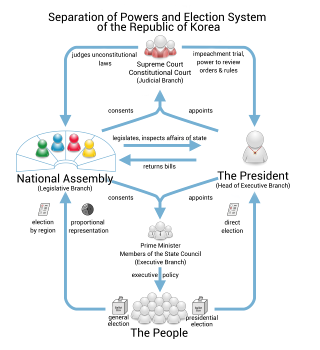
The politics of South Korea take place in the framework of a presidential representative democratic republic, whereby the president is the head of state, and of a multi-party system. To ensure a separation of powers, the Republic of Korea Government is made up of three branches: legislative, executive, and judicial. The government exercises executive power and legislative power is vested in both the government and the National Assembly. The judiciary is independent of the executive and the legislature and comprises a Supreme Court, appellate courts, and a Constitutional Court.
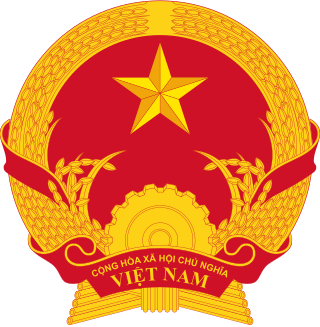
The politics of Vietnam is dominated by a single party under an authoritarian system, the Communist Party of Vietnam (CPV). The President of Vietnam is the head of state, and the Prime Minister of Vietnam is the head of government, both of these are separate from the General Secretary of the Communist Party of Vietnam who leads the CPV and is head of the Politburo and the Central Military Commission, thus the General Secretary is the de facto supreme leader of Vietnam. Executive power is exercised by the government and the President of Vietnam. Legislative power is vested in the National Assembly of Vietnam. The Judiciary is independent of the executive. The parliament adopted the current Constitution of Vietnam, its fifth, on 28 November 2013.

A legislature is an assembly with the authority to make laws for a political entity such as a country, nation or city. They are often contrasted with the executive and judicial powers of government.

Venezuela is a federal presidential republic. The chief executive is the President of Venezuela who is both head of state and head of government. Executive power is exercised by the President. Legislative power is vested in the National Assembly of Venezuela. Supreme judicial power is exercised by the Supreme Tribunal of Justice.
Unicameralism is a type of legislature, which consists of one house or assembly, that legislates and votes as one. Unicameralism has become an increasingly common type of legislature, making up nearly 60% of all national legislatures and an even greater share of subnational legislatures.

The National Assembly was the authoritative legislative body of the Republic of China, from 1947 to 2005. Along with the Control Yuan and the Legislative Yuan, the National Assembly formed the tricameral parliament of China. If still functional, at 3,045 members, the National Assembly would have been the largest parliamentary chamber in the world.

The president of the Socialist Republic of Vietnam is the head of state of Vietnam, elected by the Vietnam National Assembly from delegates of the National Assembly. Since Vietnam is a single-party state, the president is generally considered to hold the second highest position in the political system, formally after the general secretary of the Communist Party of Vietnam. In addition, the president appoints the head of government, the prime minister. As head of state, the President represents Vietnam both domestically and internationally, and maintains the regular and coordinated operation and stability of the national government and safeguards the independence and territorial integrity of the country.
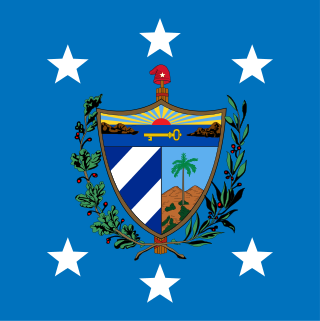
The president of Cuba, officially the president of the Republic of Cuba, is the head of state of Cuba. The office in its current form was established under the Constitution of 2019. The President is the second-highest office in Cuba and the highest state office. Miguel Díaz-Canel became President of the Council of State on 19 April 2018, taking over from Raúl Castro, and has been President of Cuba since 10 October 2019.
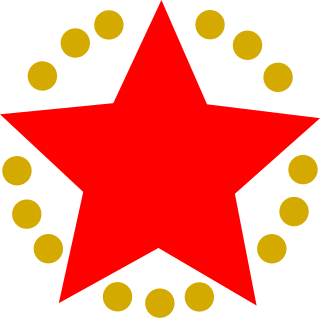
The Supreme People's Assembly is the highest organ of state power of North Korea. It is the only branch of government in North Korea, and per the principle of unified power, all state organs are subservient to it. It consists of one deputy from each of North Korea's 687 constituencies, elected to five-year terms.

During the French Revolution, the National Assembly, which existed from 17 June 1789 to 9 July 1789, was a revolutionary assembly of the Kingdom of France formed by the representatives of the Third Estate (commoners) of the Estates-General and eventually joined by some members of the First and Second Estates. Thereafter, it became a legislative body known as the National Constituent Assembly, although the shorter form was favored.

The Council of State of Cuba is a 31-member body of the government of Cuba, elected by the National Assembly of People's Power. It has the authority to exercise most legislative power between sessions of the National Assembly of People's Power, subject to its approval, and to call the National Assembly of People's Power into session between its scheduled twice yearly sessions.

The National Assembly of People's Power is the supreme organ of power of the Republic of Cuba. It is the only branch of government in the state, and per the principle of unified power, all state organs are subservient to it. It is currently composed of 470 representatives who are elected from multi-member electoral districts for a term of five years called consejos populares. The current President of the Assembly is Esteban Lazo Hernández. The Assembly only meets twice a year, with the 31-member Council of State exercising legislative power throughout the rest of the year. The most recent elections were held on 26 March 2023. The number of deputies previously was at 605, but was reduced to 470 for the 2023 election.

The Prime Minister of the Lao People's Democratic Republic, formerly the chairman of the Council of Government of the Lao People's Democratic Republic, is the head of government of Laos. The highest position in the government, they direct the country's executive branch. The prime minister is accountable to the president, the National Assembly and the country's only legal party: the Lao People's Revolutionary Party (LPRP). The current prime minister is Sonexay Siphandone, who was elected in 2022.

The National Assembly of the Socialist Republic of Vietnam is the highest body of state power of Vietnam. The National Assembly is the only branch of government in Vietnam and, in accordance with the principle of unified power, all state organs are subservient to it.

The National Assembly is the highest power organisation of Laos. It is the only branch of government in Laos, and per the principle of unified power, all state organs are subservient to it. The National Assembly meets in Vientiane.
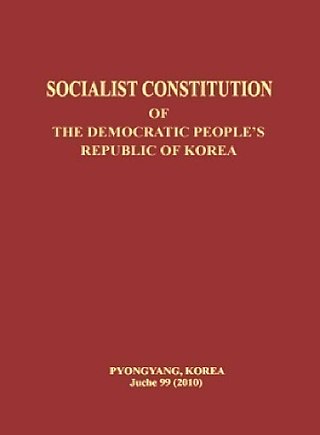
The Socialist Constitution of the Democratic People's Republic of Korea is the constitution of North Korea. It was approved by the 6th Supreme People's Assembly at its first session on 27 December 1972, and has been amended and supplemented in 1998, 2009, 2012, 2013, 2016, 2019 (twice), and in 2023. It replaced the country's first constitution which was approved in 1948.

The president of the State Affairs Commission of the Democratic People's Republic of Korea is the head of state of North Korea. The president chairs the State Affairs Commission (SAC), which is the highest leadership institution in North Korea, and serves as the commander-in-chief of the North Korean armed forces.

The Third National Assembly at Troezen was a Greek national assembly that convened at Troezen in 1827 during the latter stages of the Greek war of independence. Its aim was to complete the work of the 1826 'Third National Assembly of Epidaurus' - which had been interrupted due to the war events. The Third National Assembly at Trozen eventually ratified the first definitive charter of the First Hellenic Republic, the "Political Constitution of Greece". Additionally, statesman Ioannis Capodistrias was elected as the first Governor of the Hellenic State.
The Constitution of the Philippines is the constitution or the supreme law of the Republic of the Philippines. Its final draft was completed by the Constitutional Commission on October 12, 1986, and ratified by a nationwide plebiscite on February 2, 1987.

The National People's Congress (NPC) is the highest organ of state power of the People's Republic of China. The NPC is the only branch of government in China, and per the principle of unified power, all state organs from the State Council to the Supreme People's Court (SPC) are subservient to it. With 2,980 members in 2023, it is the largest legislative body in the world. The NPC is elected for a term of five years. It holds annual sessions every spring, usually lasting from 10 to 14 days, in the Great Hall of the People on the west side of Tiananmen Square in Beijing.























